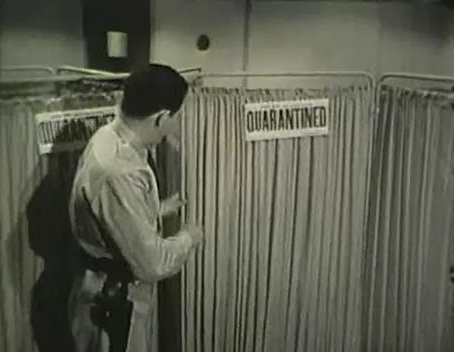Patterns
Clocks everywhere
tell the time (this is a live television production), the image is a large New
York corporation hiring a young executive to replace another of long standing.
It coincides
with, or rather expresses, the highly-diversified company’s latest growth
spurt.
Serling has the
experience and temper for this. Cook watches it all happen adroitly.
Preferably,
the Less-Used Arm
Ben Casey

Panic in the Streets (dir. Elia Kazan), with smallpox.
A case for mobilization,
if need be. A chancy business, one that must succeed (thus the surrounding
reflections of the theme, a simple intoxication, a limping gambler, a dying man
whose son the U.S. Navy flies in to see him).
“Smallpox
germs are airborne,” or as James Joyce says, “I opened the window
and In Flew Enza.”
A Big Hand for the Little Lady
A Texan swindled
in a land deal gets the money back in a Laredo poker game with five cutthroat
businessmen after sixteen years.
A pure
masterpiece, looked on somewhat askance by Robert Alden in the New York
Times because he couldn’t appreciate the puzzlement of it.
The biters bit,
the takers took, and all to their good.
Prudence and the Pill
After the
algebraic contrivances of pill and vitamin and aspirin, it unvexes itself like
the father of waters to a magnificent comedy of errors or Eros, proceeding
directly from Crabtree’s Hindle Wakes, one should think.
In fact, the
ending is rather like Bergman’s Fanny and Alexander, and
there’s an end.
“A lousy
idea to begin with,” says Roger Ebert (Chicago Sun-Times),
“an incompetent job.”
“Basic flaw
of the film,” said Variety, and so forth.
Judith Crist was,
to use Halliwell’s term, po-faced.
Eagle in a Cage
Napoleon on St.
Helena.
The situation is
imaginary, purely fictitious. The English occupy France after the wars, there
is revolution brewing. Nappy might be brought back to Paris to defend the
nation and attack Prussia, nothing more.
That was the wish
of Hitler, he saw the future of Britain on his side against the Russians. The
assassins who failed to kill him wanted nothing more.
Old and new on
St. Helena, a mistress fobbed off, one just gained.
Sir Hudson Lowe
is a gourmet cook and a frustrated military commander. Lord Sissal, a figment,
is hyperbrilliant, a thing of air and economy. Napoleon, a general and a
statesman and a wit, is ill.
An extremely
witty production, very astute on Europe, handsomely mounted, perfectly filmed
on location with an ideal cast (Haigh, Gielgud, Richardson, Whitelaw, Hale and
so forth) and a fine score. It was dismissed as pure rubbish by the reviewers
of Time and the New York Times.
Seize the Day
Hollywood and the
commodities market. One should be rich and famous. A raid of sorts on the
inarticulate.
One leaves the
Jewish wife and sons (“a marriage that made you physically sick,”
the Catholic mistress remembers). The boss hires his son-in-law.
No jobs in New
York (1956). Comex, lard covered with rye, no dice. It’s an old
man’s game, speculation.
Lumet’s Bye
Bye Braverman comes to the same conclusion.
The Member of the Wedding
Cook eschews
too-direct contrast with the film, his telefilm is a period piece in color,
enough to be going on with.
It serves as a crucible
for eliciting the mania of young genius in the heat of fruitless inspiration,
and there is a moment when the perspective all of a sudden shifts from the air
of expectation to anything but realization, “that dream” out of the
gate of ivory to “this other one”.